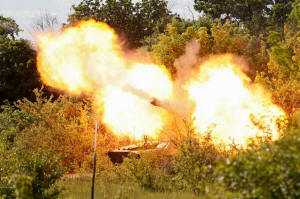Russia drives to cut off key towns in Ukraine's east
 Send a link to a friend
Send a link to a friend
 [May 25, 2022] By
Pavel Polityuk and Max Hunder [May 25, 2022] By
Pavel Polityuk and Max Hunder
KYIV/KRAMATORSK, Ukraine (Reuters) -Russian
forces intensified their assault on two key towns in Ukraine's
industrial Donbas region on Wednesday, with constant mortar bombardment
destroying houses, killing civilians and threatening the last escape
route, Ukrainian officials said.
After failing to seize Kyiv or Ukraine's second city Kharkiv, Russia is
trying to take the rest of the separatist-claimed Donbas' two provinces,
Donetsk and Luhansk, and trap Ukrainian forces in a pocket on the main
eastern front.
In the easternmost part of the Ukrainian-held Donbas pocket, the city of
Sievierodonetsk on the east bank of the Siverskiy Donets River and its
twin Lysychansk, on the west bank, have become a pivotal battlefield.
Their fall would leave the whole of Luhansk region under Russian
control, a key Kremlin war aim.
Russian forces were advancing from three directions to encircle them and
shelling the main road from the towns to Ukrainian territory in a bid to
cut off their key supply route.
President Volodymyr Zelenskiy's office said the Russians had launched an
offensive on Sievierodonetsk early on Wednesday and the town was under
constant fire from mortars.
"All the remaining strength of the Russian army is now concentrated on
this region ... the occupiers want to destroy everything there,"
Zelenskiy said of the situation in Donbas in a late night address.

Luhansk regional governor Serhiy Gaidai said six civilians had been
killed and at least eight wounded, most near bomb shelters, in
Sievierodonetsk.
Ukraine's military said it had repelled nine Russian attacks on Tuesday
in the Donbas and that Moscow's troops had killed at least 14 civilians
there, using aircraft, rocket launchers, artillery, tanks, mortars and
missiles.
Reuters could not immediately verify that information, but saw the
aftermath of the strike by at least two missiles on a train repair
facility in Pokrovsk, a hub for supplies and evacuations from the
Donetsk region.
In Kramatorsk, nearer the front line, the streets were largely deserted,
while in Sloviansk in the western Donbas, many residents took advantage
of what Ukraine said was a break in the Russian assault to leave.
"My house was bombed, I have nothing," said Vera Safronova, seated in a
train carriage among the evacuees.
FOOD BLOCKADE
Along with the eastern Donbas region, Moscow is also targeting southern
Ukraine, where officials said shelling had killed a civilian and damaged
scores of houses in Zaporozhzhia and missiles had destroyed an
industrial facility in Kryviy Rih.
Moscow has blockaded ships from southern Ukraine that would normally
export Ukrainian grain and sunflower oil through the Black Sea, pushing
up prices globally and threatening lives.
"It cannot be in Russia's interest that because of Russia, people are
dying of hunger abroad," European Commission President Ursula von der
Leyen told Reuters on Tuesday at the World Economic Forum in Davos,
calling for a dialogue.
Russia, which has blamed Ukraine and the West for the food crisis, said
on Wednesday it was ready to provide a humanitarian corridor for vessels
carrying food to leave Ukraine but said Western sanctions would need to
be lifted in return.
[to top of second column]
|

A self-propelled howitzer 2S1 Gvozdika of pro-Russian troops fires a
leaflet shell in the direction of Sievierodonetsk to disperse
information materials from their combat positions in the Luhansk
region, Ukraine May 24, 2022. REUTERS/Alexander Ermochenko

Russian Deputy Foreign Minister Andrei Rudenko was
quoted by Interfax news agency as saying solving the food problem
required a "comprehensive approach". Russia was in touch with the
United Nations, and "does not rule out the possibility of global
talks to unblock Ukraine's ports", he said.
Ukrainian lawmaker Yevheniia Kravchuk told Reuters
time was running out to get grain out as the new harvest would be in
six weeks, although it was only expected to be 70% of the normal
level because of territory being occupied or mined.
Separately, Russia's defence ministry said the port of Mariupol, the
Ukrainian city taken by Russia last week after devastating
bombardment and a three-month siege, was operating normally.
Rudenko said it was premature to establish a Russian military base
in Ukraine's Kherson region, adjacent to Crimea, which Moscow seized
from Ukraine in 2014.
Three months into the invasion, Russia still has only limited gains
to show for its worst military losses in decades, while much of
Ukraine has suffered devastation as Moscow stepped up artillery
strikes to compensate for its slow progress.
Defence Minister Sergei Shoigu said Russia was deliberately
advancing slowly in what it calls its "special operation" to avoid
civilian casualties, comments Zelenskiy dismissed as "absolutely
unreal".
ECONOMIC SQUEEZE
Western nations have imposed severe sanctions on Russia. The Biden
administration said on Tuesday it would not extend a waiver set to
expire on Wednesday that enabled Russia to continue to pay U.S.
bondholders.
The decision could push Moscow closer to the brink of default, but
unlike in most default situations, Moscow is not short of money.
Russia's debt repayment dues pale in comparison to its oil and gas
revenues, which stood at $28 billion in April alone thanks to high
energy prices.
British retailer Marks & Spencer MKS.L on Wednesday became the
latest company to announce it would pull out of Russia completely,
taking a charge of 31 million pounds ($39 million).
Zelenskiy told Davos that the conflict could only be ended with
direct talks between him and Russian President Vladimir Putin, and
said Russia should withdraw to lines in place before its Feb. 24
invasion.

"That might be a first step towards talks," he said.
The prime minister of Estonia, another former Soviet republic which
fears Russian aggression, said Ukraine should not be forced into
compromises.
"It is much more dangerous giving in to Putin than provoking him.
All these seemingly small concessions to the aggressor lead to big
wars. We have done this mistake already three times: Georgia, Crimea
and Donbas."
(Reporting by Oleksandr Kozhukhar in Lviv, Pavel Polityuk, Natalia
Zinets and Conor Humphries in Kyiv, Vitaliy Hnidiy in Kharkiv and
Reuters journalists in Mariupol and Slovyansk; Writing by Michael
Perry and Philippa Fletcher; Editing by Robert Birsel, Peter Graff
and Gareth Jones)
[© 2022 Thomson Reuters. All rights
reserved.]
This material may not be published,
broadcast, rewritten or redistributed.
Thompson Reuters is solely responsible for this content. |